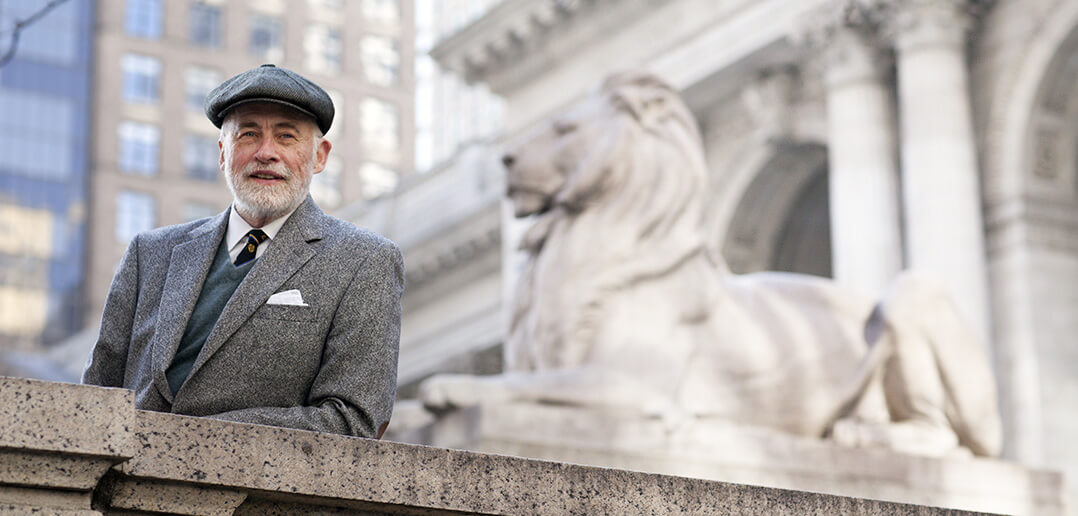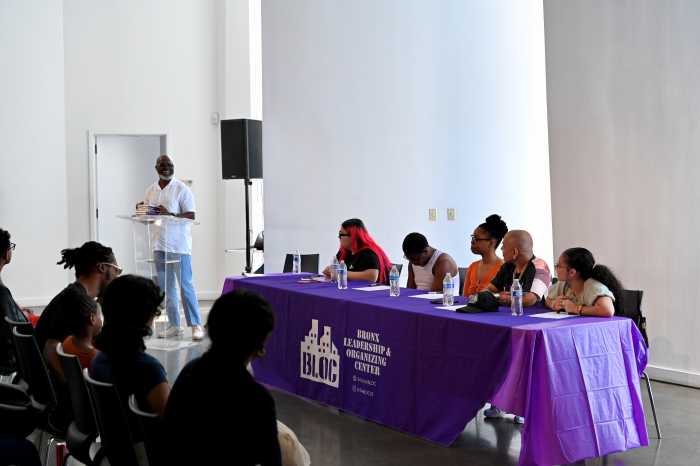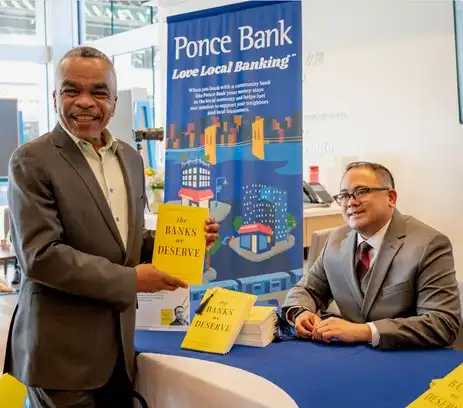For Peter Quinn, “Cross Bronx: A Writing Life” is much more than just a memoir.
Certainly, Quinn’s personal and professional life provide plenty of fodder for a memoir, since he spent three decades as a speechwriter for two New York governors, Hugh Carey and Mario Cuomo.
He also worked as a Wall Street messenger, a court officer, a high school teacher, an ad man, a documentary scriptwriter, a Hollywood film consultant, a corporate writer, the editorial director of Time Warner and also published numerous articles, essays and four novels in more than a half-century as a professional writer.
Growing up in Parkchester and attending St. Raymond Grammar School, Manhattan Prep High School, Manhattan College and Fordham University grad school, the 76-year-old Quinn views “Cross Bronx” as a hodgepodge of things, much like the borough itself.
“It’s a book about a specific time and place, and how that time and place along with family, education, and heritage helped shape me both as a person and as a writer,” Quinn explained. “Mixed in with that, it’s a bit of history of the Bronx, some history inside the politics of New York city and state, some reflections on what it meant to be raised Bronx Irish Catholic, and maybe it’s also a love letter to the Bronx, then and now.”
Sprinkled throughout the early pages of the memoir are Quinn’s remembrances of his parents and twin brother, attending all-boys parochial schools, Sunday Mass, priests and Christian brothers with various personalities and influences, hours spent at the palatial Loews Paradise and other movie theaters throughout the borough, visits to Yankee Stadium, bus and subway rides, playing with Spaldeens, the “bricks and more bricks” of tall, dense Parkchester, and even a favorite tree that against all odds shot out from the middle of the concrete, asphalt and thick car pollution of the Cross Bronx Expressway.
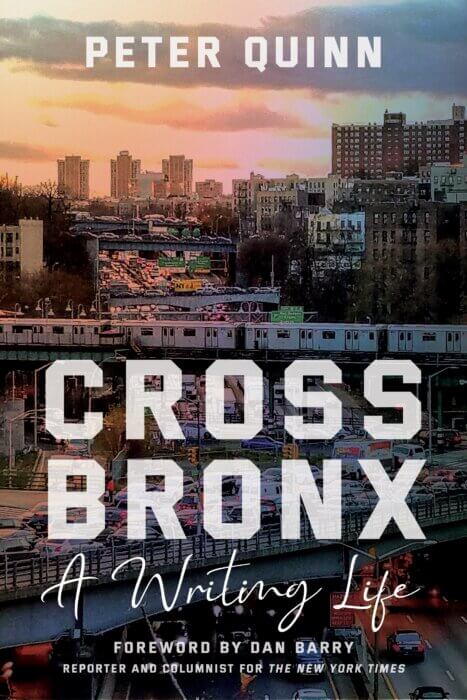
In its latter pages, Quinn’s book chronicles how from 1979 to 1985, he worked as chief speechwriter for Gov. Carey and then Gov. Cuomo, notably helping write Cuomo’s landmark speech at the 1984 Democratic Convention. The compelling, eyewitness look inside high-powered political backrooms and corporate boardrooms also covers his years as a speech writer at Time Inc. and then editorial director at Time Warner, as well as his personal life and writing career since retiring from the corporate world in 2007.
“I’ve been pretty fortunate in all the jobs I’ve had to see how people act in some of the most extreme circumstances,” Quinn said. “And through it all, I basically got paid to tell stories. My mother always told us to bring back stories from wherever we went, and the Bronx—what I call the ‘no B.S.’ borough—taught me not to be full of crap, nor full of myself.”
Published by Fordham University Press, “Cross Bronx: A Writing Life” wasn’t something that Quinn planned on penning.
“More than a few people over the years suggested that I write a memoir, but I was hesitant,” he said. “Two main things kept me from even thinking about it. First, I knew that I didn’t want to break any confidences or denigrate people I worked for or with over the years, and questioned if anyone would want to read a memoir that didn’t attack anyone. Second, there was the ingrained Irish inferiority complex. A voice inside me said ‘Who would want to read the story of your life?’”
But around the start of the pandemic, Quinn took ill and was hospitalized, followed by nearly nine months of barely being able to walk. “I found myself sitting there, stuck at home, not being able to get around much, not making much progress on a novel I’d been trying to write, and I decided to write down some of the thoughts and recollections from my life that were running around in my head,” he said. “And once I started, it just poured out onto the page.”
Quinn thought about naming the book “The Accidental Memoir,” because of how it came to be, but also because so much of his professional life happened “by accident,” in his words.
“I didn’t set out to be a speechwriter but fell into it. I never dreamed of making a living as a writer, either, which seemed to happen by accident,” Quinn noted. “But I realized the book isn’t just about my life. It’s about the Bronx, and how my own experience was like that of so many other working-class people and families, even though the details might differ. So ‘Cross Bronx’ it was.”
In the foreward to the memoir, Dan Barry of the New York Times calls Quinn “the poet laureate of the New York Irish-American experience.”
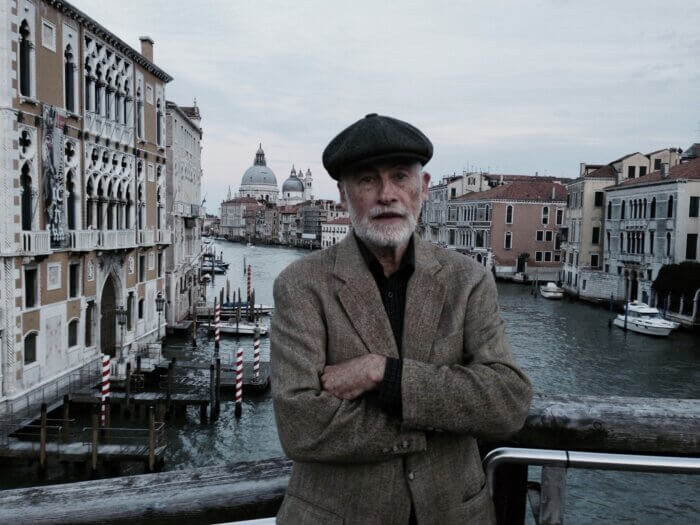
National Book Award winner Colum McCann, perhaps best known for his novel “Let The Great World Spin,” described Quinn as “one of our finest storytellers.”
So how did his Bronx Irish Catholic childhood and education shape him into that successful storyteller with such an impressive career?
“One thing was we were certainly exposed to a lot of different characters growing up,” explained Quinn. “There was this incredible mix of people. As much as a geographic space, the Bronx is above all about its people. And back then, Parkchester, like most of the Bronx, wasn’t integrated racially, but it was economically. Some fathers were lawyers, my father was a judge, some worked white-collar jobs, and others were ditch diggers, worked other manual labor jobs or were civil servants. There was a working-class mentality, with everybody striving toward a better life for their families. I think that’s the case in the Bronx today as well. There’s a striving element in the borough, back when I was growing up and through today.”
Quinn is working on another novel and is also pleased that his previous books will be re-released by an imprint of Fordham University Press.
“Looking back, I see how lucky I was when, where and how I grew up, and lucky about everything else that came after that,” he said. “I’m grateful. That, and the Bronx, are at the heart of my story.”
For more coverage, follow us on Twitter, Facebook and Instagram @bronxtimes

